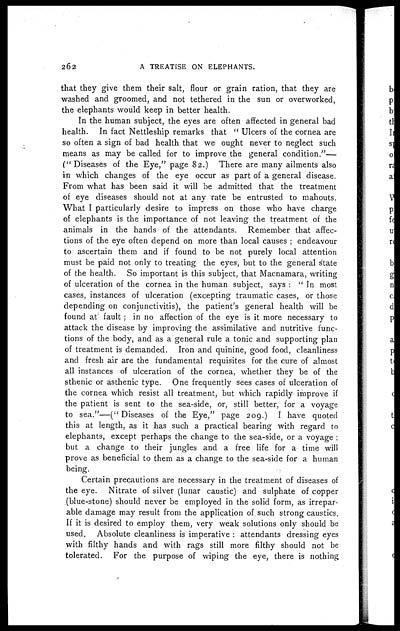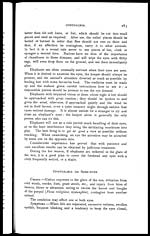Medicine - Veterinary > Veterinary diseases > Elephants and their diseases > Part IV - Non-infective diseases
(318) Page 262
Download files
Individual page:
Thumbnail gallery: Grid view | List view

262 A TREATISE ON ELEPHANTS.
that they give them their salt, flour or grain ration, that they are
washed and groomed, and not tethered in the sun or overworked,
the elephants would keep in better health.
In the human subject, the eyes are often affected in general bad
health. In fact Nettleship remarks that " Ulcers of the cornea are
so often a sign of bad health that we ought never to neglect such
means as may be called for to improve the general condition."—
(" Diseases of the Eye," page 82.) There are many ailments also
in which changes of the eye occur as part of a general disease.
From what has been said it will be admitted that the treatment
of eye diseases should not at any rate be entrusted to mahouts.
What I particularly desire to impress on those who have charge
of elephants is the importance of not leaving the treatment of the
animals in the hands of the attendants. Remember that affec-
tions of the eye often depend on more than local causes ; endeavour
to ascertain them and if found to be not purely local attention
must be paid not only to treating the eyes, but to the general state
of the health. So important is this subject, that Macnamara, writing
of ulceration of the cornea in the human subject, says : " In most
cases, instances of ulceration (excepting traumatic cases, or those
depending on conjunctivitis), the patient's general health will be
found at" fault ; in no affection of the eye is it more necessary to
attack the disease by improving the assimilative and nutritive func-
tions of the body, and as a general rule a tonic and supporting plan
of treatment is demanded. Iron and quinine, good food, cleanliness
and fresh air are the fundamental requisites for the cure of almost
all instances of ulceration of the cornea, whether they be of the
sthenic or asthenic type. One frequently sees cases of ulceration of
the cornea which resist all treatment, but which rapidly improve if
the patient is sent to the sea-side, or, still better, for a voyage
to sea."—(" Diseases of the Eye," page 209.) I have quoted
this at length, as it has such a practical bearing" with regard to
elephants, except perhaps the change to the sea-side, or a voyage ;
but a change to their jungles and a free life for a time will
prove as beneficial to them as a change to the sea-side for a human
being.
Certain precautions are necessary in the treatment of diseases of
the eye. Nitrate of silver (lunar caustic) and sulphate of copper
(blue-stone) should never be employed in the solid form, as irrepar-
able damage may result from the application of such strong caustics.
If it is desired to employ them, very weak solutions only should be
used. Absolute cleanliness is imperative : attendants dressing eyes
with filthy hands and with rags still more filthy should not be
tolerated. For the purpose of wiping the eye, there is nothing
Set display mode to: Large image | Zoom image | Transcription
Images and transcriptions on this page, including medium image downloads, may be used under the Creative Commons Attribution 4.0 International Licence unless otherwise stated. ![]()
| India Papers > Medicine - Veterinary > Veterinary diseases > Elephants and their diseases > Non-infective diseases > (318) Page 262 |
|---|
| Permanent URL | https://digital.nls.uk/75193014 |
|---|



![[Page 261]](https://deriv.nls.uk/dcn4/7519/75193013.4.jpg)
